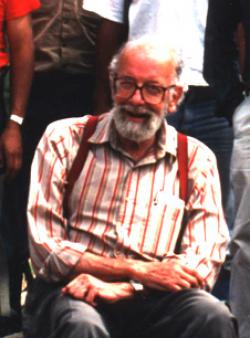
Beginning with his appointment to the Glenbow Foundation in 1954, Richard Forbis has spent some 30 years in the investigation of the archaeology of western Canada, with particular interests in early man studies. He is personally responsible for the first systematic programme of archaeological investigations in Alberta, having undertaken extensive fieldwork all over the province. His involvement in archaeological investigations has continued to this day, and in recent years he has extended his personal research interests to include studies of comparable early man cultures in South and Central America.
Dr. Forbis was a Killam Memorial Fellow in 1977 and his name can be found in such noteworthy directories as American Men and Women in Science, Leaders in Anthropology, and Who's Who in America. His resume lists over 60 publications.
As the first archaeologist at the University of Calgary, Dr. Forbis was directly involved in and personally responsible for many facets of the development of the Department of Archaeology there. This was Canada's first university department specifically concerned with instruction in archaeology. He has taught continuously in that department, and has been a major influence on the careers of many of the archaeologists currently holding academic and related positions all across Canada.
As Chairman of the Public Hearings into the Conservation of Historical and Archaeological Resources in Alberta in 1972, Dr. Forbis played a critical role in the development of the Alberta Historical Resources Act. This piece of landmark legislation was enacted as a direct result of the report of these hearings, and introduced into Canada a new era of heritage public policy. Many of the principles present in that Act have since been adopted by other provincial and territorial jurisdictions, but at the time of its passage it was without precedence in Canada, and represented a major achievement in the struggle to gain public acceptance of the need to protect heritage resources. The principles enunciated through the public hearings process and subsequently enacted by the Alberta government are clear reflections of the principles advocated by Dr. Forbis in word and in deed throughout his career.
On the basis of these significant contributions to research, teaching, and the fostering of public awareness, the Executive of the Canadian Archaeological Association is pleased to present the Smith-Wintemberg Award for outstanding achievement to Richard G. Forbis.
Robert R. Janes,
President,
Canadian Archaeological Association
Acknowledgment
Bill Byrne kindly assembled much of the information on which these remarks have been based.
previously published in the Canadian Journal of Archaeology 8(1):1–2, 1984.
